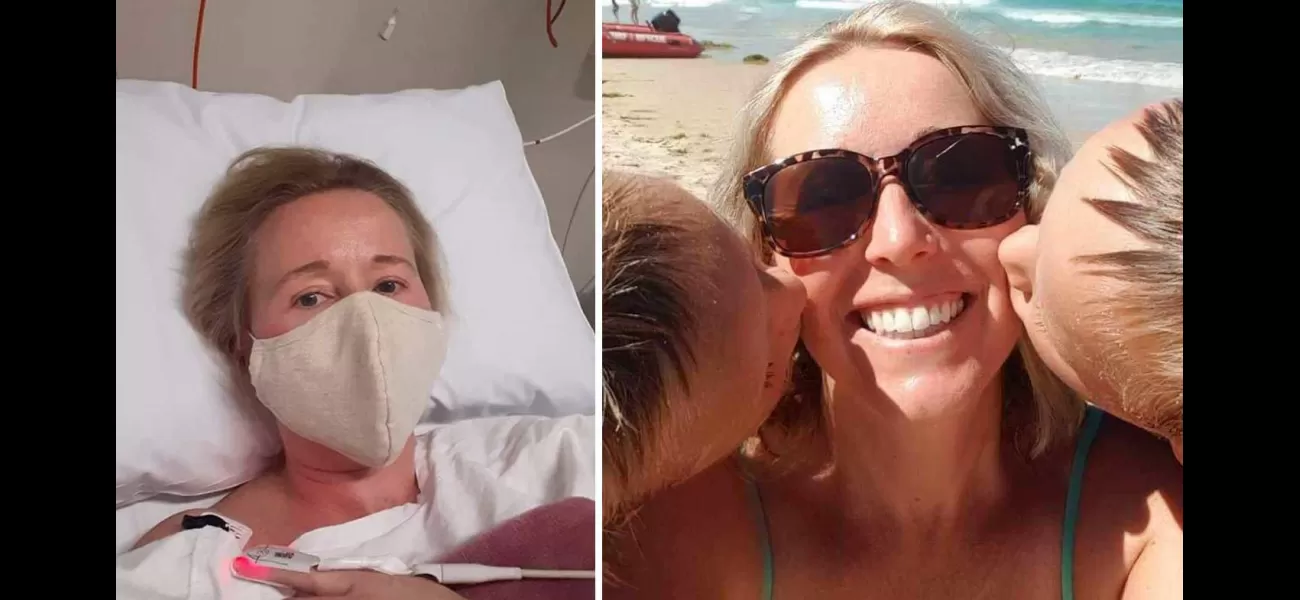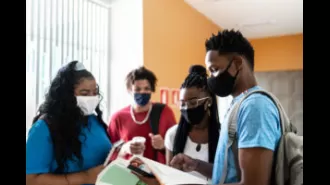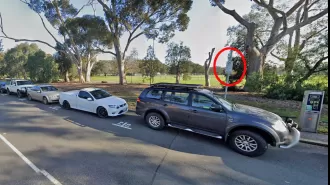Christie's pain was ignored until she was diagnosed with "terminal" endometriosis after years of suffering.
NSW mom Christie Smith is bedridden with pain for 5 years.
July 2nd 2024.

Christie Smith, a mother of four, has been confined to her bed for the past five years due to excruciating pain. She resides in Shellharbour with her family in the NSW Illawarra region. Her daily struggle is caused by a rare form of endometriosis that has reached its end-stage, meaning the endometrial tissue has spread uncontrollably throughout her body, making it impossible to remove through surgery.
Unfortunately, the endometriosis has not only affected Smith's reproductive system, but it has also spread to her bladder, bowel, kidneys, liver, diaphragm, and even her lungs. The constant pain has made it difficult for her to walk, swallow, and even breathe. She shared with 9news.com.au, "I'm in bed for 23 hours out of 24 because the pain is unbearable due to the scar tissue and adhesions."
Smith has bravely come forward to raise awareness about the debilitating effects of endometriosis and to advocate for women with the condition to be taken seriously. She reveals that she was ignored and dismissed by doctors for years, despite pleading for help as her condition worsened.
Endometriosis has been a part of Smith's life since her teenage years, causing her to suffer from agonizing periods. However, it took her a decade to receive a formal diagnosis. She shared, "I tried to get a diagnosis, but endometriosis does not show up on scans. I went through multiple scans, but they all showed nothing."
It wasn't until Smith had a life-threatening ectopic pregnancy in 2005 that her endometriosis was finally diagnosed. The incident led to emergency surgery, where doctors discovered that her fallopian tube was scarred and covered in endometrial tissue. Along with the diagnosis, Smith was also told that she would never be able to conceive due to the damage caused by the endometriosis.
However, with the help of IVF, Smith and her husband were blessed with four boys in three years, including identical twins. Once they decided that their family was complete, Smith sought to have her uterus removed due to the excruciating symptoms that she still experienced. She shared, "Whenever I got my period, I couldn't even get out of bed for several days. I also struggled to urinate and have bowel movements due to the pain."
To her dismay, the gynecologist she consulted dismissed her concerns, stating that her endometriosis wasn't severe enough to warrant surgery. Despite having a written diagnosis, the doctor refused to believe her and even sent her for a CT scan that showed nothing. Smith explained, "He did a pelvic exam and said, 'No, nothing feels tethered.'"
Smith admitted that the doctor's response made her doubt herself, despite the constant pain she was in. She shared, "I started questioning myself, thinking maybe I don't have it anymore because he said it can go into remission after pregnancy. I was gaslit to the point where I didn't know if it was all in my head."
Four years later, Smith underwent surgery to remove a hernia in her groin. During the operation, doctors discovered that the hernia was caused by an endometrioma, a cyst related to endometriosis, that had grown through her abdominal muscle and into her inguinal canal. She then consulted a new gynecologist who agreed to remove her uterus in 2019.
However, what was supposed to be a straightforward surgery turned into a seven-and-a-half-hour procedure with multiple surgeons involved. They discovered that the endometriosis had spread to almost all of Smith's abdominal organs, resulting in a frozen pelvis. This rare and severe stage of endometriosis causes the pelvic organs to fuse and become stuck together. Smith shared, "They had to remove my entire bowel from the back of my abdomen because it was completely stuck down. That's why I was in so much pain."
Dr. Jason Chow, one of Smith's doctors and a pain specialist at the Royal Hospital for Women in Sydney, explained that advancements in imaging technology have made it possible to detect severe cases of endometriosis before surgery. However, he also mentioned that the pain does not always correlate with the amount of endometriosis a person has. He shared, "Some people might have severe endometriosis without experiencing any symptoms."
Chow also emphasized that regardless of the stage of endometriosis, a patient's pain should be taken seriously. He also addressed some medical myths about the condition, such as the belief that pregnancy can cure endometriosis. He stated, "This is based on a commentary from the early 1900s and has since been disproven. Pregnancy may provide temporary relief, but it doesn't cure endometriosis."
Smith's friend, Rosalynne Glarey, started a GoFundMe campaign to help fund her access to a spa for pain relief and physiotherapy. Smith's body no longer responds to the maximum-dose opioid painkillers she has been taking, and she has been advised against further surgery due to potential complications and increased pain.
In a final message, Smith emphasized the need for women to be believed when they are in pain. She stated, "If a man had this happen and was in pain like this, no doctor would just say come back in four months and tell me how it feels. They would investigate. If it stops you from living your life, then it's too much pain." She encourages women to seek medical help if they are worried about their symptoms.
Unfortunately, the endometriosis has not only affected Smith's reproductive system, but it has also spread to her bladder, bowel, kidneys, liver, diaphragm, and even her lungs. The constant pain has made it difficult for her to walk, swallow, and even breathe. She shared with 9news.com.au, "I'm in bed for 23 hours out of 24 because the pain is unbearable due to the scar tissue and adhesions."
Smith has bravely come forward to raise awareness about the debilitating effects of endometriosis and to advocate for women with the condition to be taken seriously. She reveals that she was ignored and dismissed by doctors for years, despite pleading for help as her condition worsened.
Endometriosis has been a part of Smith's life since her teenage years, causing her to suffer from agonizing periods. However, it took her a decade to receive a formal diagnosis. She shared, "I tried to get a diagnosis, but endometriosis does not show up on scans. I went through multiple scans, but they all showed nothing."
It wasn't until Smith had a life-threatening ectopic pregnancy in 2005 that her endometriosis was finally diagnosed. The incident led to emergency surgery, where doctors discovered that her fallopian tube was scarred and covered in endometrial tissue. Along with the diagnosis, Smith was also told that she would never be able to conceive due to the damage caused by the endometriosis.
However, with the help of IVF, Smith and her husband were blessed with four boys in three years, including identical twins. Once they decided that their family was complete, Smith sought to have her uterus removed due to the excruciating symptoms that she still experienced. She shared, "Whenever I got my period, I couldn't even get out of bed for several days. I also struggled to urinate and have bowel movements due to the pain."
To her dismay, the gynecologist she consulted dismissed her concerns, stating that her endometriosis wasn't severe enough to warrant surgery. Despite having a written diagnosis, the doctor refused to believe her and even sent her for a CT scan that showed nothing. Smith explained, "He did a pelvic exam and said, 'No, nothing feels tethered.'"
Smith admitted that the doctor's response made her doubt herself, despite the constant pain she was in. She shared, "I started questioning myself, thinking maybe I don't have it anymore because he said it can go into remission after pregnancy. I was gaslit to the point where I didn't know if it was all in my head."
Four years later, Smith underwent surgery to remove a hernia in her groin. During the operation, doctors discovered that the hernia was caused by an endometrioma, a cyst related to endometriosis, that had grown through her abdominal muscle and into her inguinal canal. She then consulted a new gynecologist who agreed to remove her uterus in 2019.
However, what was supposed to be a straightforward surgery turned into a seven-and-a-half-hour procedure with multiple surgeons involved. They discovered that the endometriosis had spread to almost all of Smith's abdominal organs, resulting in a frozen pelvis. This rare and severe stage of endometriosis causes the pelvic organs to fuse and become stuck together. Smith shared, "They had to remove my entire bowel from the back of my abdomen because it was completely stuck down. That's why I was in so much pain."
Dr. Jason Chow, one of Smith's doctors and a pain specialist at the Royal Hospital for Women in Sydney, explained that advancements in imaging technology have made it possible to detect severe cases of endometriosis before surgery. However, he also mentioned that the pain does not always correlate with the amount of endometriosis a person has. He shared, "Some people might have severe endometriosis without experiencing any symptoms."
Chow also emphasized that regardless of the stage of endometriosis, a patient's pain should be taken seriously. He also addressed some medical myths about the condition, such as the belief that pregnancy can cure endometriosis. He stated, "This is based on a commentary from the early 1900s and has since been disproven. Pregnancy may provide temporary relief, but it doesn't cure endometriosis."
Smith's friend, Rosalynne Glarey, started a GoFundMe campaign to help fund her access to a spa for pain relief and physiotherapy. Smith's body no longer responds to the maximum-dose opioid painkillers she has been taking, and she has been advised against further surgery due to potential complications and increased pain.
In a final message, Smith emphasized the need for women to be believed when they are in pain. She stated, "If a man had this happen and was in pain like this, no doctor would just say come back in four months and tell me how it feels. They would investigate. If it stops you from living your life, then it's too much pain." She encourages women to seek medical help if they are worried about their symptoms.
[This article has been trending online recently and has been generated with AI. Your feed is customized.]
[Generative AI is experimental.]
0
0
Submit Comment





